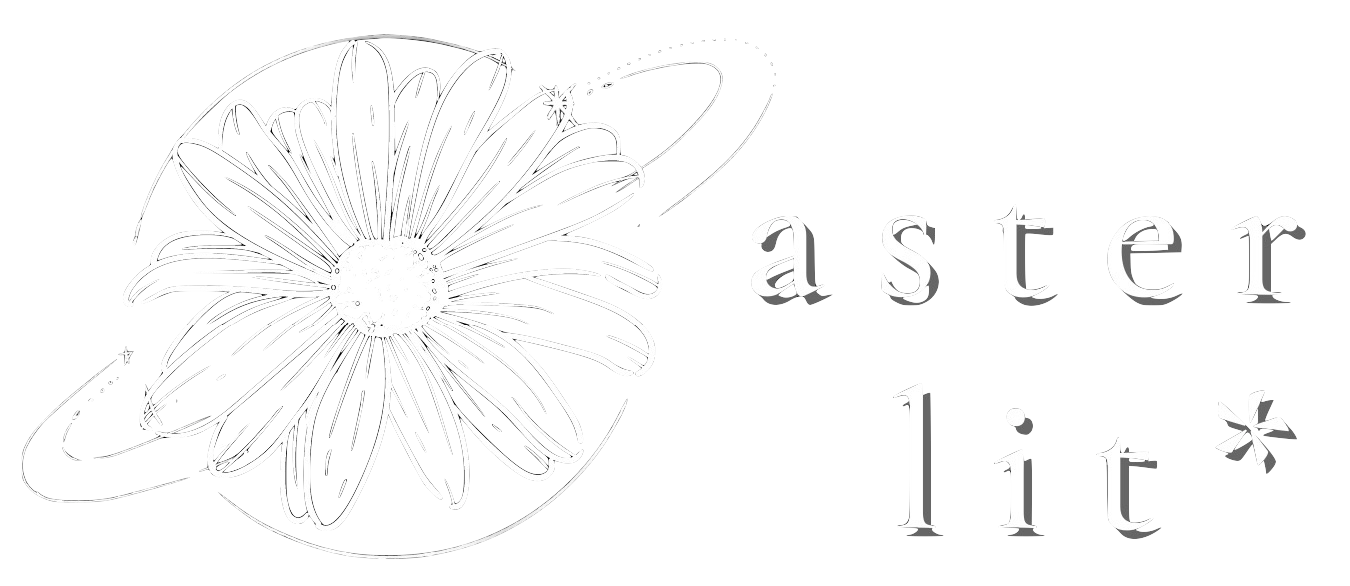
Aster Lit: Lacuna
Issue 10—Winter 2023
Düsterkeit
Stella Vazquez, United States
[ feminine, uncountable ]
noun
Gloom, somberness, dimness
We had it tattooed identically on each of our pointer fingers. Alys took hers on the left hand, for
it was her nondominant hand and I had always been too much of a people pleaser to let her know
that mine was the same, even in a case of ink and this much permanence. German was not a
language I commanded, and could barely grasp, but we agreed that the tattoo was less intentional
in its linguistic meaning and more in its symbolism. That we would be empty without this
experience, and without knowing one another.
The hostel had only one small bathroom for the whole of our women’s dorm, so we took turns
washing the black-inked word with tap water and crude yellow soap. Perhaps it was quick, and
irrational, and unclean, but I didn’t care, and it seemed that neither did Alys. Far worse acts of
devotion had been committed.
At night, Alys slept with an arm dangling from the side of her bunk, crossed over her chest and
into the dark interior night air. I was a stomach sleeper by nature, so I turned to flatten my spine
against the mattress and let gravity do its work to keep my fingers from chafing against the thin
sheets. In the mornings, when Alys would rouse me from my two-houred slumber, I would
plaster on a smile like a tattoo bandage and pretend I had slept more than those two hours on my
back. She dragged me for coffee quite early and quite often; the popular German variety was far
too rich and far too deep for the both of us, so we matched again beyond the tattoo ink in the skin
of our arms. But it kept us awake, and alert, and buzzing and vibrant enough to forget the ache of
the needle and wander the Pergamon and the Bode and the Altes museums until we had grown
weary of the portraiture and remembered our own ink we had to deal with. It was never a gloomy
ordeal, though, to trudge from the stone halls back to the tiny hostel on tired feet and redress the
worded wound. Alys seemed to exude an energy upon me which I had long in myself forgotten,
since I was a child in the sandbox. That the world would always be waiting for me to take new
steps in it. At night, we would suck down cold-bottled beers and fried potatoes and odd sauces
and chicken broth and watch the moon anoint the sky, and it would be quiet. This seemed to be
the only hour that Alys tired, as a normal person would. But when she fell tired, I fell
silent—that little energy she had given me went to bed when she did. I felt nothing at all when
she resigned to sleep, and resigned from the world of wake where she was my friend. I myself
never slept well in that hostel, no matter the position, regardless of the tattoo. I was constantly
kept up by the snores from the other women bunkmates, and the moon through the window of
our room. I think of that moon often, and if she still sees it.
It’s the cliche of departure. Alys and I parted ways on the train line for Vienna. For me, at least, it
had been Vienna; she had family in Budapest that waited for her return like she was a soldier in
my American experience. I hugged her, awkwardly, as the doors of the tin car rolled open and
she shouldered her bag. It seemed out of place, even for her level of energy. I felt bad. Perhaps
hugs were reserved for friends of more than a week, for friends at home; I didn’t know much of
those. Alys had been my first consistency, even for seven days in a dank and cramped hostel
room in Berlin. I traveled to find myself, but I had found her instead. And perhaps she had not
hugged back, I thought as the train rolled away from the station, because she thought the tattoo
would reunite us in the future. No goodbyes are given when you believe you will reunite. I must
have seemed certain we would never reunite. She must have thought otherwise.
And in the end, she was right.
I think of Alys often. Germany had been a stop from Switzerland and on the way to Austria, and
I had never taken to the German language as fluidly as she had, but I knew one word, the one
needled into my finger. Düsterkeit. Gloom, sorrowness, dimness. What we share when we are
apart, and what we remedy when we are together.
Stella Vazquez is a writer from Northern California whose work is influenced by the passage and perception of time. She lives in a pile of pages and is slowly beginning to send them out into the world.
